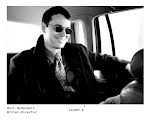When one travels and works with visual things -
architecture, painting or sculpture - one uses
one's eyes and draws, so as to fix deep down in
one's experience what is seen. Once the
impression is recorded, it stays for good, entered
registered and inscribed. The camera is a tool for
idlers, who use a machine to do their seeing for them.
To draw oneself, to trace the lines, to handle the
volumes, organize the surface... all this means to
first look, and then to observe, and finally perhaps
to discover ... and it is then that inspiration may
come. Inventing, creating, one's whole being is
drawn into action, and it is this action which counts.
Others stood indifferent - but you saw!
Journey to the East
Le Corbusier
(Charles-Edouard Jeanneret)
 |
| sketch by Le Corbusier |
Recently my nephew, Brooklyn Architect, Nicholas McDermott, gave me Le Corbusier's Journey to the East. The text is lucid and interesting, and as you can tell from the excerpt above, it can be inspiring as well; but as interesting as as the narrative can be, it's the architect's sketches which grab hold of the attention and won't let go.
Architects' sketches are not designed as ends in themselves but as means to an ends. While an artist tries to transform reality in his drawings, an architect is trying to render faithfully either some artifact as it already exists or some idea he wants to bring into being. In the latter case, it can be either be some idea already worked out, or it can be his thinking through his idea there on the page.
For this reason, an architect's sketch gives us a much better sense of how the eye sees space than
does a sketch by a typical artist. the structure os sight is there for anyone who would explore it.
• • •

